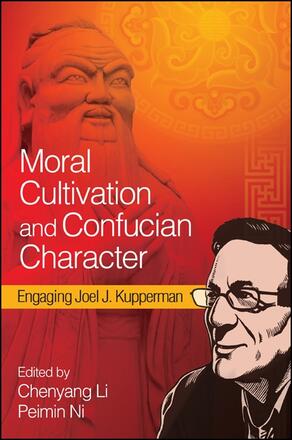
Moral Cultivation and Confucian Character
Engaging Joel J. Kupperman
Alternative formats available from:
A consideration of Confucian ethics that employs the work and concerns of the eminent comparative ethicist Joel J. Kupperman.
Description
In this volume, leading scholars in Asian and comparative philosophy take the work of Joel J. Kupperman as a point of departure to consider new perspectives on Confucian ethics. Kupperman is one of the few eminent Western philosophers to have integrated Asian philosophical traditions into his thought, developing a character-based ethics synthesizing Western, Chinese, and Indian philosophies. With their focus on Confucian ethics, contributors respond, expand, and engage in critical dialogue with Kupperman's views. Kupperman joins the conversation with responses and comments that conclude the volume.
Chenyang Li is Associate Professor of Philosophy at Nanyang Technological University, Singapore, where he also founded and directs the Philosophy Program. His books include The Confucian Philosophy of Harmony and The Tao Encounters the West: Explorations in Comparative Philosophy, also published by SUNY Press. Peimin Ni is Professor of Philosophy at Grand Valley State University and the author of several books, including On Confucius.
Reviews
"…[a] thought-provoking collection that pays homage to Kupperman's achievements while building upon them … this volume contains high-quality essays and compelling analyses. Taken together they present a wealth of information on contemporary scholars' active engagement with Joel J. Kupperman's exceptional achievements in comparatively dealing with Confucianism and Asian philosophy … Meticulously researched and broad in scope, this volume is bound to inspire more studies on this promising topic. Therefore, it is highly recommended for both scholars and advanced students of Asian philosophy and comparative philosophy. " — Monumenta Serica
"…a very welcome volume. " — Journal of Chinese Studies
"…the essays in Moral Cultivation and Confucian Character all have distinctive merits of their own, making the volume a lively platform of contemporary scholarship on ethics in its own right. " — SirReadaLot. org
"Joel Kupperman is rightly celebrated for his success at drawing on Eastern traditions to enlarge our (Western) understanding of key issues in philosophy. The impressive essays in this volume extend Kupperman's approach with stimulating reflections on character, emotions, and well-being. " — Stephen C. Angle, author of Contemporary Confucian Political Philosophy
"Each essay by a major figure in comparative philosophy is a masterful engagement with the Confucian tradition that reveals its resources for us today. Scholars and students of both Chinese philosophy and comparative philosophy will want to read this impressive volume. " — Owen Flanagan, author of The Bodhisattva's Brain: Buddhism Naturalized